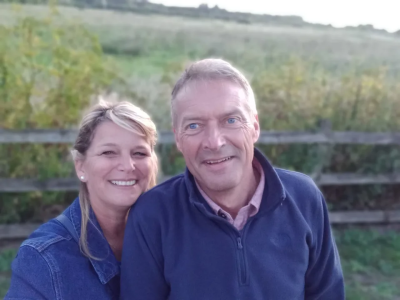She suspected an affair, but his strange behaviour revealed an unexpected truth
- Replies 11
Late last year, life drastically changed for 55-year-old Emma Ruscoe and her husband Sirnon, 58.
The couple had been married for 31 years, and both lived an active and healthy life together. Or, at least, they had until recently.
Emma started to observe strange changes in her husband's behaviour, including becoming withdrawn and disinterested in going out with friends, strange arguments, and trouble on frequently travelled routes.
These changes had started occurring around the end of 2015, and Emma initially thought her husband might be having an affair. She was so worried that she was determined to get to the bottom of it.
Fortunately, that determination led to Emma and her husband eventually visiting their local GP, where they received an Alzheimer’s referral because of Simon’s rapidly deteriorating cognitive state.
After the initial referral, Simon received a letter in June 2018 saying he didn't have dementia – but his condition continued to get worse.
Emma eventually got the confirmation she had been desperately seeking – her husband wasn't being unfaithful, but he was suffering from early onset dementia. Despite the sadness of the diagnosis, Emma felt a real sense of relief that she now knew what was wrong.
'I can't fault my GP,' Emma says. 'They did refer us to the memory clinic, however, I think they should also be sign-posting people to the Alzheimer's Society as well. We would have gotten so much advice and support.'
Now, Emma and Simon are adjusting to life since the diagnosis as best they can. And although Simon's condition is continuing to worsen, Emma is thankful she still has her husband by her side.
'Watching the person I have grown up with disappear is heartbreaking,' says Emma. 'On bad days it feels like my heart is being ripped out, but on good days I think I am lucky that he is still here.'
This story is sadly all too familiar to a lot of us, who may also be caring for a partner suffering from dementia. If you are in the same position, the Dementia Australia website has resources and advice for those affected, and the dementia helpline should be your go-to contact if you wish to talk more about this complex disease.
In a country where almost 450,000 people live with dementia, Australia offers a wealth of support resources and organisations for those affected by this devastating disease. They offer comprehensive guidance, practical advice, and a network of individuals who understand profoundly the trials and tribulations related to the disease. Through these resources, many Australians have obtained comfort, actionable strategies and a sense of community.
Dementia Australia is one such organisation that plays a pivotal role in the lives of many Australian families. As the national organisation for people of all ages, living with all forms of dementia, their family and carers, it provides support services, education, and information on the disease. They resonate with Emma's belief – that no one should have to face dementia alone.
Another stellar resource is Carers Australia. This national body represents Australia's carers, advocating on their behalf, and providing crucial information and support. It’s no secret that caring for a loved one suffering from dementia can be emotionally and physically exhausting, Carers Australia seeks to alleviate some of this strain, offering resources to help caretakers care for themselves as well.
Then there’s the virtual platform, My Aged Care, that helps you find information about aged care services and what you need to do to receive them. It also offers an online assessment and useful connections to local support services.
Australia is brimming with numerous organisations and initiatives aimed at easing the burden of this difficult journey. These resources not only provide practical tools and advice, but also create a community – a family – that weathers the storm that dementia brings, together.
Let us know your thoughts on this story in the comment section below!
The couple had been married for 31 years, and both lived an active and healthy life together. Or, at least, they had until recently.
Emma started to observe strange changes in her husband's behaviour, including becoming withdrawn and disinterested in going out with friends, strange arguments, and trouble on frequently travelled routes.
These changes had started occurring around the end of 2015, and Emma initially thought her husband might be having an affair. She was so worried that she was determined to get to the bottom of it.
Fortunately, that determination led to Emma and her husband eventually visiting their local GP, where they received an Alzheimer’s referral because of Simon’s rapidly deteriorating cognitive state.
After the initial referral, Simon received a letter in June 2018 saying he didn't have dementia – but his condition continued to get worse.
Emma eventually got the confirmation she had been desperately seeking – her husband wasn't being unfaithful, but he was suffering from early onset dementia. Despite the sadness of the diagnosis, Emma felt a real sense of relief that she now knew what was wrong.
'I can't fault my GP,' Emma says. 'They did refer us to the memory clinic, however, I think they should also be sign-posting people to the Alzheimer's Society as well. We would have gotten so much advice and support.'
Now, Emma and Simon are adjusting to life since the diagnosis as best they can. And although Simon's condition is continuing to worsen, Emma is thankful she still has her husband by her side.
'Watching the person I have grown up with disappear is heartbreaking,' says Emma. 'On bad days it feels like my heart is being ripped out, but on good days I think I am lucky that he is still here.'
This story is sadly all too familiar to a lot of us, who may also be caring for a partner suffering from dementia. If you are in the same position, the Dementia Australia website has resources and advice for those affected, and the dementia helpline should be your go-to contact if you wish to talk more about this complex disease.
In a country where almost 450,000 people live with dementia, Australia offers a wealth of support resources and organisations for those affected by this devastating disease. They offer comprehensive guidance, practical advice, and a network of individuals who understand profoundly the trials and tribulations related to the disease. Through these resources, many Australians have obtained comfort, actionable strategies and a sense of community.
Dementia Australia is one such organisation that plays a pivotal role in the lives of many Australian families. As the national organisation for people of all ages, living with all forms of dementia, their family and carers, it provides support services, education, and information on the disease. They resonate with Emma's belief – that no one should have to face dementia alone.
Another stellar resource is Carers Australia. This national body represents Australia's carers, advocating on their behalf, and providing crucial information and support. It’s no secret that caring for a loved one suffering from dementia can be emotionally and physically exhausting, Carers Australia seeks to alleviate some of this strain, offering resources to help caretakers care for themselves as well.
Then there’s the virtual platform, My Aged Care, that helps you find information about aged care services and what you need to do to receive them. It also offers an online assessment and useful connections to local support services.
Australia is brimming with numerous organisations and initiatives aimed at easing the burden of this difficult journey. These resources not only provide practical tools and advice, but also create a community – a family – that weathers the storm that dementia brings, together.
Let us know your thoughts on this story in the comment section below!










